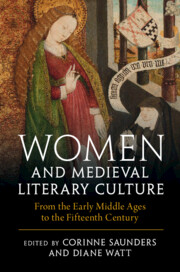Book contents
- Women and Medieval Literary Culture
- Women and Medieval Literary Culture
- Copyright page
- Contents
- Illustrations
- Contributors
- Acknowledgements
- Introduction
- I Patrons, Owners, Writers, and Readers in England and Europe
- II Circles and Communities in England
- Chapter 4 Ancrene Wisse, the Katherine Group, and the Wooing Group as Textual Communities, Medieval and Modern
- Chapter 5 Syon Abbey and the Birgittines
- Chapter 6 What the Paston Women Read
- III Health, Conduct, and Knowledge
- IV Genre and Gender
- V Women as Authors
- General Index
- Index of Manuscripts
- References
Chapter 4 - Ancrene Wisse, the Katherine Group, and the Wooing Group as Textual Communities, Medieval and Modern
from II - Circles and Communities in England
Published online by Cambridge University Press: 28 July 2023
- Women and Medieval Literary Culture
- Women and Medieval Literary Culture
- Copyright page
- Contents
- Illustrations
- Contributors
- Acknowledgements
- Introduction
- I Patrons, Owners, Writers, and Readers in England and Europe
- II Circles and Communities in England
- Chapter 4 Ancrene Wisse, the Katherine Group, and the Wooing Group as Textual Communities, Medieval and Modern
- Chapter 5 Syon Abbey and the Birgittines
- Chapter 6 What the Paston Women Read
- III Health, Conduct, and Knowledge
- IV Genre and Gender
- V Women as Authors
- General Index
- Index of Manuscripts
- References
Summary
This essay focuses on Ancrene Wisse and the Ancrene Wisse Group of which this work is part. Ancrene Wisse survives in a significant number of manuscripts, and its place within the literary tradition of medieval women in England seems uncontroversial. However, nineteenth- and twentieth-century editors, many of whom were men, tended to focus on the linguistic significance of these texts, paying little attention to their gendered devotional context. They also placed much greater emphasis on speculation concerning the identity of the male author of Ancrene Wisse than on examining the role of its immediate audience in shaping the work addressed to them. Women scholars working on the Ancrene Wisse Group have, in contrast, tended to be more aware of the importance of the material in relation to the history of womenߣs anchoritism and more open to the possibility of womenߣs authorship of some of the works within this group. The essay suggests that Ancrene Wisse had an expansive direct and indirect influence not only on later texts but also on womenߣs devotional traditions, which, Sauer suggests, may also have extended beyond England.
Keywords
- Type
- Chapter
- Information
- Women and Medieval Literary CultureFrom the Early Middle Ages to the Fifteenth Century, pp. 83 - 103Publisher: Cambridge University PressPrint publication year: 2023



